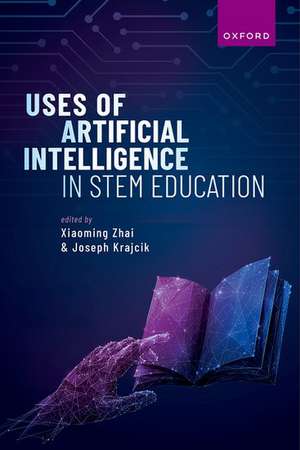Uses of Artificial Intelligence in STEM Education
Editat de Xiaoming Zhai, Joseph Krajciken Limba Engleză Hardback – 24 oct 2024
Preț: 717.75 lei
Preț vechi: 1108.20 lei
-35% Nou
Puncte Express: 1077
Preț estimativ în valută:
137.34€ • 143.41$ • 113.41£
137.34€ • 143.41$ • 113.41£
Carte disponibilă
Livrare economică 14-20 martie
Preluare comenzi: 021 569.72.76
Specificații
ISBN-13: 9780198882077
ISBN-10: 0198882076
Pagini: 624
Dimensiuni: 160 x 240 x 30 mm
Greutate: 1.14 kg
Editura: OUP OXFORD
Colecția OUP Oxford
Locul publicării:Oxford, United Kingdom
ISBN-10: 0198882076
Pagini: 624
Dimensiuni: 160 x 240 x 30 mm
Greutate: 1.14 kg
Editura: OUP OXFORD
Colecția OUP Oxford
Locul publicării:Oxford, United Kingdom
Recenzii
Accelerating AI capabilities is introducing both the opportunity and the requirement to reimagine education. Artfully blending discussions of technology and education, Uses of Artificial Intelligence in STEM Education is a seminal collection exploring the profound impact that AI will have on learning, instruction, and assessment. With themes of ethics, fairness, and inclusiveness woven throughout the book, this is a must-read for anyone wanting to understand how AI will fundamentally reshape the educational landscape
This volume speaks to all science education scholars, offering a broad-ranging description of the field's current state regarding the integration of AI. Zhai and Krajcik use their wide-ranging experience to couple a comprehensive exploration of the topic with a critical evaluation and reflection on the progress to date and the significant challenges ahead. In light of the rapidly evolving nature of this phenomenon, the insights provided here are exceptionally important.
Science educators have long pioneered the integration of emerging computing tools into the research and practices of STEM education... Zhai and Krajcik's foundational volume will accelerate critical thinking about and research-informed appropriations of frontier artificial intelligence advances into the richly interdisciplinary STEM education field. Our AI in Education scholarship benefits from their authors' contributions to the four themes of inquiry for the book's chapters—assessment, learning tools, teacher development, and ethics.
This volume speaks to all science education scholars, offering a broad-ranging description of the field's current state regarding the integration of AI. Zhai and Krajcik use their wide-ranging experience to couple a comprehensive exploration of the topic with a critical evaluation and reflection on the progress to date and the significant challenges ahead. In light of the rapidly evolving nature of this phenomenon, the insights provided here are exceptionally important.
Science educators have long pioneered the integration of emerging computing tools into the research and practices of STEM education... Zhai and Krajcik's foundational volume will accelerate critical thinking about and research-informed appropriations of frontier artificial intelligence advances into the richly interdisciplinary STEM education field. Our AI in Education scholarship benefits from their authors' contributions to the four themes of inquiry for the book's chapters—assessment, learning tools, teacher development, and ethics.
Notă biografică
Xiaoming Zhai is an Associate Professor in Science Education & Artificial Intelligence, serving as Director of the AI4STEM Education Center at the University of Georgia. He is interested in applying cutting-edge technologies such as AI to advance science teaching and learning, particularly assessment practices. He is lead investigator on federal-funded projects and his research has been published in top-tier journals. He has collaborated widely with researchers from the USA, Canada, Germany, Norway, China, Ghana, and India, and serves as a global leader in his area of research. Dr. Zhai chaired the NSF-funded 2022 International Conference for AI-based Assessment in STEM and serves as Founding Chair of the National Association of Research in Science Teaching's RAISE (Research in AI-involved Science Education) group.Joseph Krajcik currently serves as Director of the CREATE for STEM Institute at Michigan State University. CREATE for STEM (Collaborative Research for Education, Assessment and Teaching Environments for Science, Technology, Engineering, and Mathematics) is a joint institute between the Colleges of Natural Science and Education that seeks to improve the teaching and learning of science and mathematics from kindergarten to college through innovation and research. During his career, Professor Krajcik has focused on working with science teachers to reform science teaching practices to promote students' engagement in and learning of science through the design, development, and testing of project-based science learning environments.
